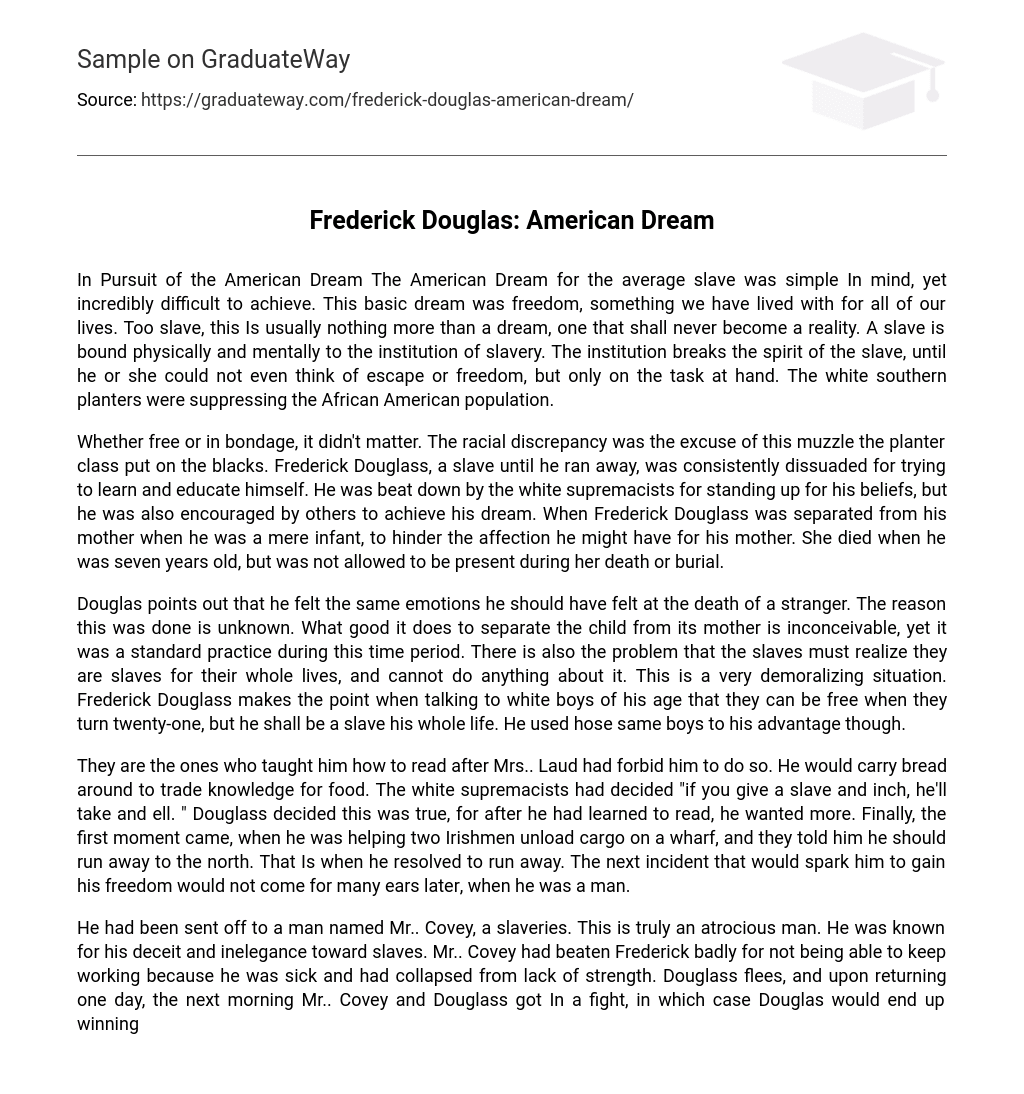In Pursuit of the American Dream The American Dream for the average slave was straightforward In mind, yet exceedingly challenging to accomplish. This fundamental dream was freedom, something we have lived with for all of our lives. For a slave, this Is generally nothing more than a dream, one that shall never become a reality. A slave is physically and mentally bound to the institution of slavery. The institution shatters the spirit of the slave until they could not even conceive of escape or freedom, but only focus on the task at hand. The white southern planters were oppressing the African American population.
Irrespective of their status as free or enslaved individuals, the planter class used racial differences as a justification to oppress black people. Frederick Douglass, an escaped slave, endured constant discouragement in his pursuit of education. Advocating his beliefs resulted in him being physically assaulted by white supremacists, although he also received support from others who encouraged him to follow his aspirations. When he was just a baby, Frederick Douglass was deliberately separated from his mother to prevent any emotional attachment towards her. Tragically, she passed away when he reached the age of seven and he was forbidden from attending her funeral or being present at her death.
Douglas acknowledges experiencing the same emotions as one would when a stranger dies, without revealing the cause behind it. During that period, separating a child from their mother was unfathomable, yet it was a prevalent custom. Additionally, slaves were forced to accept their lifelong status and lacked the ability to alter it, resulting in a disheartening predicament. Frederick Douglass exemplifies this circumstance through his interactions with white boys of his age group who had the prospect of attaining freedom at twenty-one while he remained enslaved indefinitely. Nevertheless, he skillfully utilized these boys for his own advantage.
They were the ones who taught him how to read after Mrs. Laud had forbidden him to do so. He would carry bread around to exchange knowledge for food. The white supremacists had concluded that “if you give a slave an inch, he’ll take a yard.” Douglass agreed with this statement because once he learned to read, he desired more. Eventually, the pivotal moment occurred when he assisted two Irishmen with unloading cargo on a wharf, and they advised him to escape to the north. This was when he made a firm decision to flee. However, it would take several years as a man before the next event would motivate him to pursue his freedom.
He was sent off to Mr. Covey, a man who was known for his deceit and mistreatment of slaves. Mr. Covey had violently beaten Frederick when he collapsed from illness and could not continue working. Frederick escaped, but when he returned, he got into a fight with Mr. Covey the next morning, which Frederick ended up winning. This was important to him because he not only defeated a white man but also because it renewed his determination to be free.
All he needs now is a little push to achieve his ultimate goal, the American Dream – freedom. He bravely mingled with the other slaves and discovered that they also longed for liberation. Together, they devised an escape plan, but sadly, they were betrayed and recaptured. Due to his leadership role, Frederick was isolated from the rest. Surprisingly, this failed attempt to escape did not silence him; instead, it fueled his determination and passion even more.
Despite facing significant challenges, Frederick Douglass was moving closer towards his dream. With assistance from friends in Baltimore, he was able to escape slavery. Remarkably, as an African American during that era, Douglass was highly regarded for his intellect, which was unusual for someone of his background. By overcoming immense obstacles and defying societal norms, he not only gained physical freedom but also achieved mental liberation. Douglass surpassed the limitations imposed on blacks by educating himself and eventually embarked on international travels to deliver lectures on abolition and the rights of African Americans in the United States.





